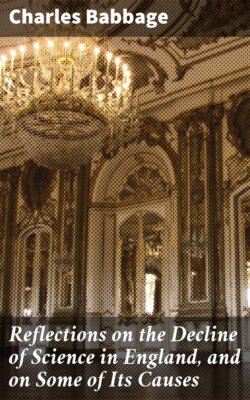Читать книгу Reflections on the Decline of Science in England, and on Some of Its Causes - Charles Babbage - Страница 8
На сайте Литреса книга снята с продажи.
SECTION 1. PROFESSIONAL IMPULSES.
ОглавлениеTable of Contents
A large portion of those who are impelled by ambition or necessity to advance themselves in the world, make choice of some profession in which they imagine their talents likely to be rewarded with success; and there are peculiar advantages resulting to each from this classification of society into professions. The ESPRIT DE CORPS frequently overpowers the jealousy which exists between individuals, and pushes on to advantageous situations some of the more fortunate of the profession; whilst, on the other hand, any injury or insult offered to the weakest, is redressed or resented by the whole body. There are other advantages which are perhaps of more importance to the public. The numbers which compose the learned professions in England are so considerable, that a kind of public opinion is generated amongst them, which powerfully tends to repress conduct that is injurious either to the profession or to the public. Again, the mutual jealousy and rivalry excited amongst the whole body is so considerable, that although the rank and estimation which an individual holds in the profession may be most unfairly appreciated, by taking the opinion of his rival; yet few estimations will be found generally more correct than the opinion of a whole profession on the merits of any one of its body. This test is of great value to the public, and becomes the more so, in proportion to the difficulty of the study to which the profession is devoted. It is by availing themselves of it that men of sense and judgment, who have occasion for the services of professional persons, are, in a great measure, guided in their choice.
The pursuit of science does not, in England, constitute a distinct profession, as it does in many other countries. It is therefore, on that ground alone, deprived of many of the advantages which attach to professions. One of its greatest misfortunes arises from this circumstance; for the subjects on which it is conversant are so difficult, and require such unremitted devotion of time, that few who have not spent years in their study can judge of the relative knowledge of those who pursue them. It follows, therefore, that the public, and even that men of sound sense and discernment, can scarcely find means to distinguish between the possessors of knowledge, in the present day, merely elementary, and those whose acquirements are of the highest order. This remark applies with peculiar force to all the more difficult applications of mathematics; and the fact is calculated to check the energies of those who only look to reputation in England.
As there exists with us no peculiar class professedly devoted to science, it frequently happens that when a situation, requiring for the proper fulfilment of its duties considerable scientific attainments, is vacant, it becomes necessary to select from among amateurs, or rather from among persons whose chief attention has been bestowed on other subjects, and to whom science has been only an occasional pursuit. A certain quantity of scientific knowledge is of course possessed by individuals in many professions; and when added to the professional acquirements of the army, the navy, or to the knowledge of the merchant, is highly meritorious: but it is obvious that this may become, when separated from the profession, quite insignificant as the basis of a scientific reputation.
To those who have chosen the profession of medicine, a knowledge of chemistry, and of some branches of natural history, and, indeed, of several other departments of science, affords useful assistance. Some of the most valuable names which adorn the history of English science have been connected with this profession.
The causes which induce the selection of the clerical profession are not often connected with science; and it is, perhaps, a question of considerable doubt whether it is desirable to hold out to its members hopes of advancement from such acquirements. As a source of recreation, nothing can be more fit to occupy the attention of a divine; and our church may boast, in the present as in past times, that the domain of science has been extended by some of its brightest ornaments.
In England, the profession of the law is that which seems to hold out the strongest attraction to talent, from the circumstance, that in it ability, coupled with exertion, even though unaided by patronage, cannot fail of obtaining reward. It is frequently chosen as an introduction to public life. It also presents great advantages, from its being a qualification for many situations more or less remotely connected with it, as well as from the circumstance that several of the highest officers of the state must necessarily have sprung from its ranks.
A powerful attraction exists, therefore, to the promotion of a study and of duties of all others engrossing the time most completely, and which is less benefited than most others by any acquaintance with science. This is one amongst the causes why it so very rarely happens that men in public situations are at all conversant even with the commonest branches of scientific knowledge, and why scarcely an instance can be cited of such persons acquiring a reputation by any discoveries of their own.
But, however consistent other sciences may be with professional avocations, there is one which, from its extreme difficulty, and the overwhelming attention which it demands, can only be pursued with success by those whose leisure is undisturbed by other claims. To be well acquainted with the present state of mathematics, is no easy task; but to add to the powers which that science possesses, is likely to be the lot of but few English philosophers.
